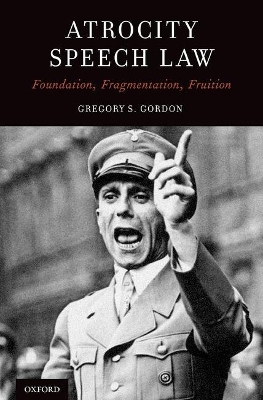
Atrocity Speech Law
Oxford University Press Inc (Verlag)
978-0-19-061268-9 (ISBN)
This book does. To understand how the law became so fragmented, it returns to its roots to explain how it was formulated. From there, it proposes a set of nostrums to deal with the individual deficiencies. Its analysis then culminates in a more comprehensive proposal: a Unified Liability Theory, which would systematically link the core crimes of genocide, crimes against humanity, and war crimes with the four illicit speech modalities. The latter would be placed in one statutory provision criminalizing the following types of speech: (1) incitement (speech seeking but not resulting in atrocity); (2) speech abetting (non-catalytic speech synchronous with atrocity commission); (3) instigation (speech seeking and resulting in atrocity); and (4) ordering (instigation/incitement within a superior-subordinate relationship). Apart from its fragmentation, this body of law lacks a proper name as Incitement Law or International Hate Speech Law, labels often used, fail to capture its breadth or relationship to mass violence. So this book proposes a new and fitting appellation: atrocity speech law.
Professor Gregory S. Gordon is Associate Dean for Development/External Affairs, and Director of the Research Postgraduates Program at The Chinese University of Hong Kong Faculty of Law. A prolific expert on international criminal law, he has published in the Virginia Journal of International Law, Columbia Journal of Transnational Law, Journal of Criminal Law and Criminology, Ohio State Law Journal, and Oregon Law Review, among others. Before academia, he served as a prosecutor with both the U.S. Department of Justice and the International Criminal Tribunal for Rwanda. For the latter, the Attorney General awarded him a commendation for Service to the United States and International Justice. He has appeared as an expert on CNN, the BBC, and NPR, and has lectured at the UN, the International Criminal Court, and the U.S. Holocaust Memorial Museum. He serves as a hate speech project consultant for the International Nuremberg Principles Academy.
Foreword by Benjamin B. Ferencz
Preface
Introduction
Part I: Foundation
Chapter 1: Speech and Atrocity: An Historical Sketch
Chapter 2: International Human Rights Law and Domestic Law
Chapter 3: The Birth of Atrocity Speech Law:
Nuremberg and the Foundational Statutes
Chapter 4: The Birth of Atrocity Speech Law:
The Foundational Ad Hoc Tribunal Cases and Offense Elements
PART II: FRAGMENTATION
Chapter 5: Problems regarding the Crime of
Direct and Public Incitement to Commit Genocide
Chapter 6: Problems regarding Persecution, Instigation and Ordering
Chapter 7: The Absence of Criminal Prohibitions
Regarding Hate Speech and War Crimes
PART III: FRUITION
Chapter 8: Fixing Incitement to Genocide
Chapter 9: Fixing Persecution, Instigation and Ordering
Chapter 10: Adopting Incitement to Commit War Crimes
Chapter 11: Restructuring: A Unified Liability Theory for Atrocity Speech Law
Conclusion
Index
| Erscheinungsdatum | 06.05.2017 |
|---|---|
| Verlagsort | New York |
| Sprache | englisch |
| Maße | 155 x 236 mm |
| Gewicht | 721 g |
| Themenwelt | Geisteswissenschaften ► Geschichte |
| Recht / Steuern ► EU / Internationales Recht | |
| Recht / Steuern ► Öffentliches Recht ► Völkerrecht | |
| Sozialwissenschaften ► Politik / Verwaltung | |
| ISBN-10 | 0-19-061268-1 / 0190612681 |
| ISBN-13 | 978-0-19-061268-9 / 9780190612689 |
| Zustand | Neuware |
| Haben Sie eine Frage zum Produkt? |
aus dem Bereich


